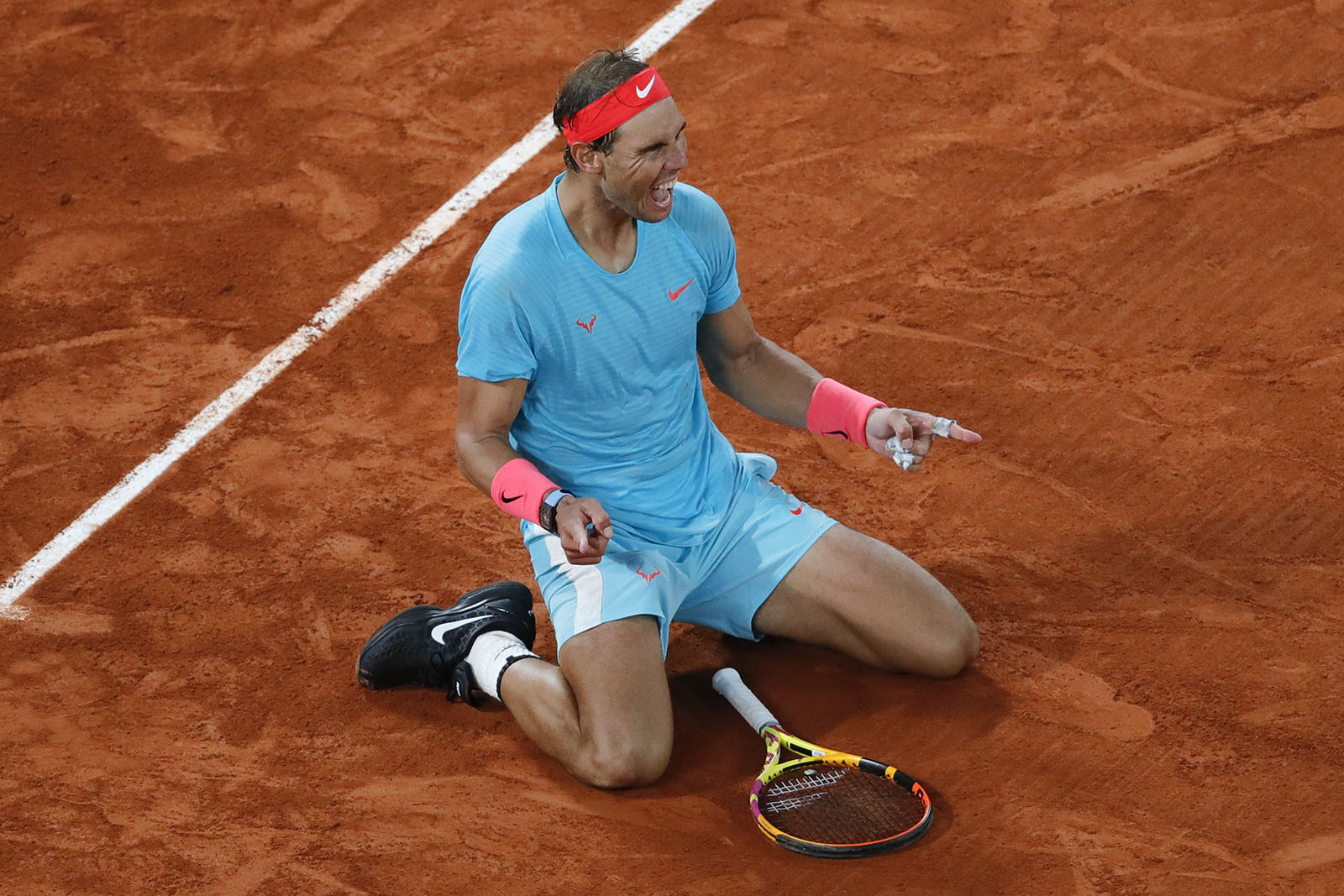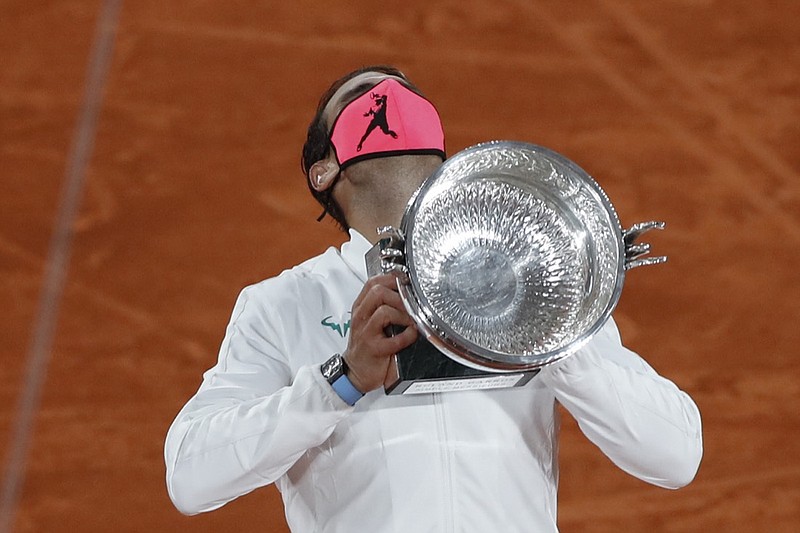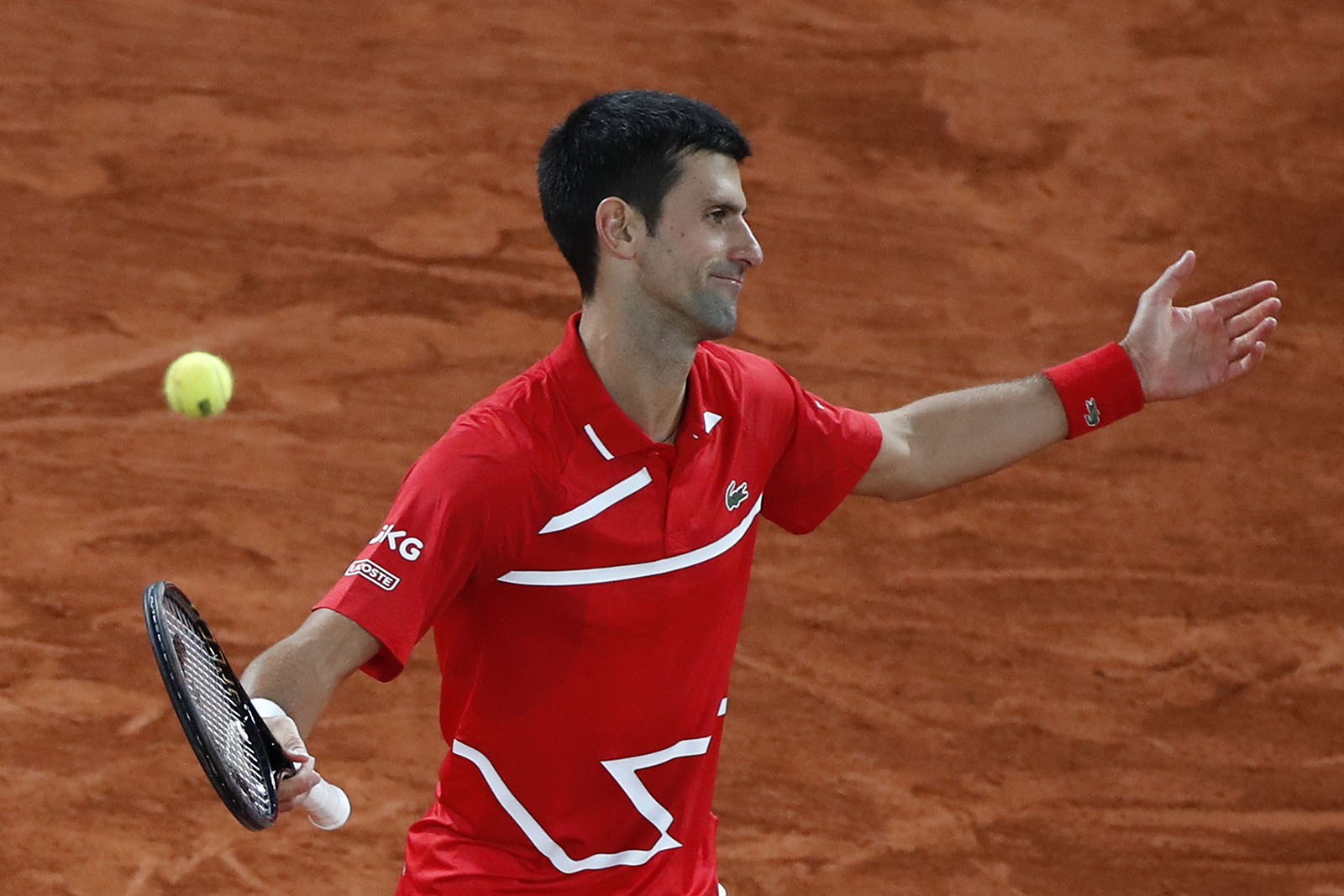 AP photo by Christophe Ena / Rafael Nadal celebrates after beating Novak Djokovic 6-0, 6-2, 7-5 to win the French Open on Sunday at Roland Garros in Paris. Nadal extended his own record by winning the clay court major tournament for the 13th time, and he matched Roger Federer's record for Grand Slam men's singles title at 20.
AP photo by Christophe Ena / Rafael Nadal celebrates after beating Novak Djokovic 6-0, 6-2, 7-5 to win the French Open on Sunday at Roland Garros in Paris. Nadal extended his own record by winning the clay court major tournament for the 13th time, and he matched Roger Federer's record for Grand Slam men's singles title at 20.PARIS - All the years of work, all the many wins, led to this moment, with Rafael Nadal preparing to serve against Novak Djokovic, one point from a 13th French Open championship, one point from a 20th Grand Slam trophy to tie Roger Federer's record for men's singles.
Nadal swept his right foot along the baseline, clearing away the red dust as he has so many times before. He rapped his shoes' soles with his racket - right, then left, then right again. He discarded one tennis ball behind him, slipped another in the pocket of his blue shorts.
And then, finally ready to proceed, Nadal delivered an ace at 106 mph to cap a flawless performance and a surprisingly lopsided 6-0, 6-2, 7-5 victory over the No. 1-ranked Djokovic. Nadal dropped to his knees, smiling broadly, and pumped his arms.
Neither Djokovic, on this day, nor Federer, over the course of time, ever truly stood a chance of resisting the relentless Nadal.
"He keeps going. No holding him back, it seems like. It's amazing. I mean, I admire all his achievements, especially the one here," said Djokovic, who had won his past five Grand Slam finals. "There's not much you can say. All the superlatives that you can use, he deserves them."
It's the fourth time the No. 2-ranked Nadal won his favorite tournament without ceding a set and made his career mark at the French Open 100-2. No, that is not a typo.
The 34-year-old left-hander from Spain has won the clay court major four straight times, following previous streaks of four (2005-08) and five (2010-14). Those go alongside four triumphs at the U.S. Open, two at Wimbledon and one at the Australian Open.
Nadal made clear that while he never has been consumed with the idea of catching Federer, he can appreciate the accomplishment's significance.
"I would love to finish my career being the player with more Grand Slams. No doubt about that, no? But on the other hand, I say, 'OK, I have to do (it) my way. ... I'm not going to be thinking all the time, 'Novak (has) this one, Roger is winning the other one.' You can't be always unhappy because your neighbors have a bigger house than you or a bigger boat or have a better phone," Nadal said.
"In terms of these records, of course I care. I am a big fan of the history of sport, in general. I respect, a lot, that. For me, (it) means a lot to share this number with Roger, no?"
Federer sat out the U.S. Open and French Open after two knee operations. The 39-year-old Swiss star posted a congratulatory message on Instagram on Sunday.
"As my greatest rival over many years, I believe we have pushed each other to become better players," Federer wrote, and ended with: "I hope 20 is just another step on the continuing journey for both of us. Well done, Rafa. You deserve it."
Djokovic's loss, meanwhile, left him at 17 majors; had the 33-year-old Serbian won, the standings would have read 20-19-18. No other man has more than 14.
This was the 56th installment of Nadal versus Djokovic, the most between men in the professional era. Djokovic is ahead 29-27 now, including his 6-3, 6-2, 6-3 win at the 2019 Australian Open final.
"In Australia, he killed me. ...Today was for me," Nadal said.
The key statistic Sunday: Nadal limited himself to 14 unforced errors, impressive against anyone, but especially someone the caliber of Djokovic, who accumulated 52.
"He's phenomenal," Djokovic said. "He played a perfect match, especially in the first two sets."
The first set was a 45-minute master class conducted by Nadal, who came out incredibly crisply and cleanly, steering his high-rpm forehands precisely where he wanted them and using his defense-to-offense abilities to slide and stretch and flick balls back with aggression.
"I played at my highest level," Nadal said, "when I needed to play at my highest level."
Appearing resigned, Djokovic was less volatile than he often is when he struggles - such as the post-point whack of a ball that inadvertently hit a line judge at the U.S. Open last month, earning a disqualification, his only other loss in 39 matches this season.
Instead, Djokovic puffed his cheeks or rolled his eyes, exasperated with himself, perhaps, but also unable to figure out how to counter what came from the other side of the net. After one exchange, he put up his palms, as if to ask, "What can I do here?"
It was only the fourth 6-0 set lost by Djokovic in 341 career Grand Slam matches. As he sat in his sideline seat digesting that shutout, four Djokovic supporters in blue jerseys and white baseball hats stood and sang in the stands, their chorus drowning out the light pitter-patter of drizzle hitting the retractable roof.
The highly anticipated matchup between these two titans of their sport was the first indoor French Open men's final, contested under Court Philippe Chatrier's new cover. From its stand in the VIP section, the Coupe des Mousquetaires trophy glistened under the artificial lights.
This also was the first French Open contested with players walking on court wearing masks on account of the coronavirus pandemic, also the reason the tournament shifted from its traditional May-June dates to September-October and crowds were limited to 1,000 per day. On Sunday, those lucky enough to attend mainly were concentrated in clumps in the first 20 or so rows.
"An important day for me, but I'm not stupid, no?" Nadal said afterward. "Is still a very sad situation worldwide."
The seasonal change led to colder, wetter weather than usual, which affects the way the clay affects shots, making them bounce lower and slower. Some, including Nadal, wondered aloud whether that would hinder him, as could the tournament's change to a slightly heavier ball.
He figured, he said, "this year will probably be too difficult."
So much for that. He dealt with Djokovic's predilection for drop shots much better than previous foes, using anticipation and speed to dim that strategy's success.
"Didn't work great today, let's say," Djokovic admitted.
Nadal took five of Djokovic's first six service games and broke seven times in all. Nadal faced only five break points himself, saving four.
More than two hours in, when Djokovic employed a backhand winner to get his lone break, making it 3-all in the third set, he let out a couple of roars and waved his arms to ask for more noise from fans.
Too little, too late. Less than a half-hour later, it was over.
"Rafa has proven everybody wrong," Djokovic said. "That's why he's a great champion."

